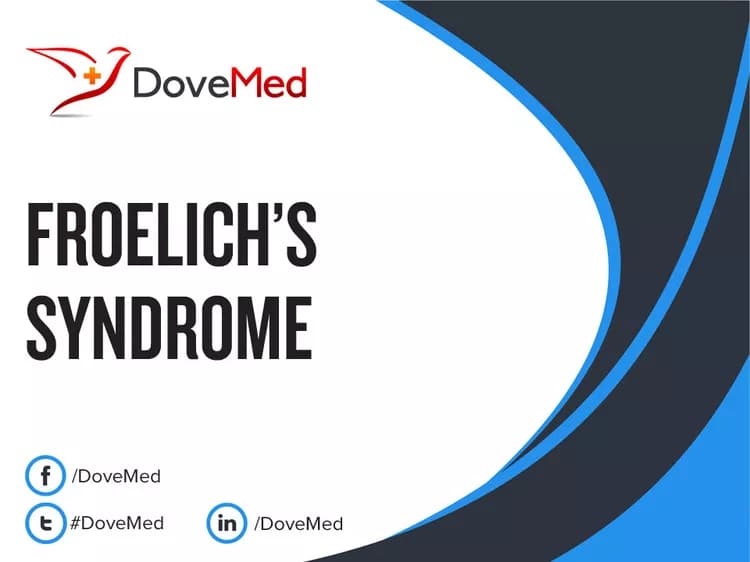What are the other Names for this Condition? (Also known as/Synonyms)
- Abscess of Pituitary Syndrome
- Babinski-Froelich Syndrome
- Sexual Infantilism causing Froelich's Syndrome
What is Froelich's Syndrome? (Definition/Background Information)
- Froelich's Syndrome, also known as Adiposogenital Dystrophy, is a rare acquired disorder that occurs,
- Either due to a tumorous growth near the pituitary gland in the brain
- Or, due to a dysfunctional hypothalamus (an organ lying close to the pituitary)
- Pituitary gland and hypothalamus malfunction causes endocrinal abnormalities, growth retardation (short physical stature and sexual growth issues), obesity, and vision loss
- Treatment of Froelich's Syndrome is by performing surgical excision of the tumor and using suitable hormone replacement therapy. The individual’s response to treatment dictates the prognosis of the condition
Who gets Froelich's Syndrome? (Age and Sex Distribution)
- Any individual (regardless of age, sex, race, or ethnic inclination) may be affected by Froelich's Syndrome
- However, the condition is mostly seen in males
- Usually children and adolescents are affected
What are the Risk Factors for Froelich's Syndrome? (Predisposing Factors)
The risk factors of Froelich's Syndrome may include:
- Formation of lesions (due to various reasons) in the pituitary gland or hypothalamus resulting in an abnormal function
- Any growth of a tumor in the pituitary, or in the hypothalamus
- Any infection causing brain damage, such as due to tuberculosis
It is important to note that having a risk factor does not mean that one will get the condition. A risk factor increases one's chances of getting a condition compared to an individual without the risk factors. Some risk factors are more important than others.
Also, not having a risk factor does not mean that an individual will not get the condition. It is always important to discuss the effect of risk factors with your healthcare provider.
What are the Causes of Froelich's Syndrome? (Etiology)
- The most frequent cause of Froelich’s Syndrome is a disruption of normal functioning of both the hypothalamus and pituitary, due to an abnormal growth or lesion
- The hypothalamus helps the pituitary gland to function normally. Additionally, the hypothalamus is also responsible for many body metabolic processes
- Any tumor or inflammation of hypothalamus or pituitary gland can disrupt the regular functioning of the organs, leading to metabolic and endocrinal abnormalities
What are the Signs and Symptoms of Froelich's Syndrome?
The key signs and symptoms of Froelich’s Syndrome include:
- Increased appetite, leading to weight gain; uncontrolled appetite can cause morbid obesity
- Retarded physical growth and late skeletal development, resulting in obese and short stature
- Small and abnormal fingernails
- Frequent headaches in children
- Skin can easily get damaged due to sunlight
- Retarded sexual growth, delayed onset of puberty, underdeveloped gonads (testes and ovaries), altered secondary sex features
- Damage to optic nerve resulting from tumor growth, vision impairment
- Reduced blood pressure and blood glucose levels
- Body temperature remains lower than normal (hypothermia)
- Excessive urination (polyuria)
- Causing excessive thirst (polydipsia)
How is Froelich's Syndrome Diagnosed?
Diagnostic tests that are performed to evaluate Froelich’s Syndrome condition may include:
- The physician conducts a physical examination to recognize the characteristic signs of the disorder and evaluates the patient’s medical history
- Urine tests to investigate various hormonal levels
- Blood tests to determine hypothalamus function and pituitary function. These may include TSH test, FSH test, LH test, GH test, prolactin levels, and ADH levels
- Blood cultures, if an infection is suspected
- Imaging studies of brain to screen for any tumor growth. These may include X-ray of the skull, CT scan of head and neck region, and MRI scan of brain
Many clinical conditions may have similar signs and symptoms. Your healthcare provider may perform additional tests to rule out other clinical conditions to arrive at a definitive diagnosis.
What are the possible Complications of Froelich's Syndrome?
Complications, due to Froelich’s Syndrome, are those that arise from severe forms of the disorder, which may include:
- Obesity
- Delayed physical and sexual growth
- In some cases, even the mental growth is affected
- Diabetes mellitus (rare)
How is Froelich's Syndrome Treated?
Control of physiological imbalances and symptomatic treatment approach is followed, for an individual with Froelich’s Syndrome. These treatment measures include:
- Hormonal replacement therapy: The absent or decreased hormones are replaced using pituitary hormone derivatives
- Tumors affecting the pituitary and hypothalamus, may be surgically removed
- Good diet control and weight loss regimen can aid overweight individuals. Gastric banding or gastric bypass surgery for weight loss may be considered
How can Froelich's Syndrome be Prevented?
Even though Froelich’s Syndrome is believed to be an acquired syndrome, the precise cause of the abnormality is uncertain. Current preventive measures are in eliminating or reducing the risk factors.
What is the Prognosis of Froelich's Syndrome? (Outcomes/Resolutions)
- Froelich’s Syndrome is thought to be the consequence of a tumor or lesion, affecting the hypothalamus and pituitary gland in the brain. A surgical intervention to remove the tumor and replacement of hormones is the preferred treatment course. Resolution depends on the response of the individual to treatment
- In some children, an onset of puberty (which may be delayed), marks the start of a normal development
- Information on any fatalities are currently unavailable
Additional and Relevant Useful Information for Froelich's Syndrome:
- A genetic disorder, called Prader Willi Syndrome, resembles Froelich’s Syndrome signs and symptoms, closely
- A few other disorders, namely Bardet-Biedl syndrome and Börjeson-Forssman-Lehman syndrome, also seem to have similar signs and symptoms
Related Articles
Test Your Knowledge
Asked by users
Related Centers
Related Specialties
Related Physicians
Related Procedures
Related Resources
Join DoveHubs
and connect with fellow professionals


0 Comments
Please log in to post a comment.